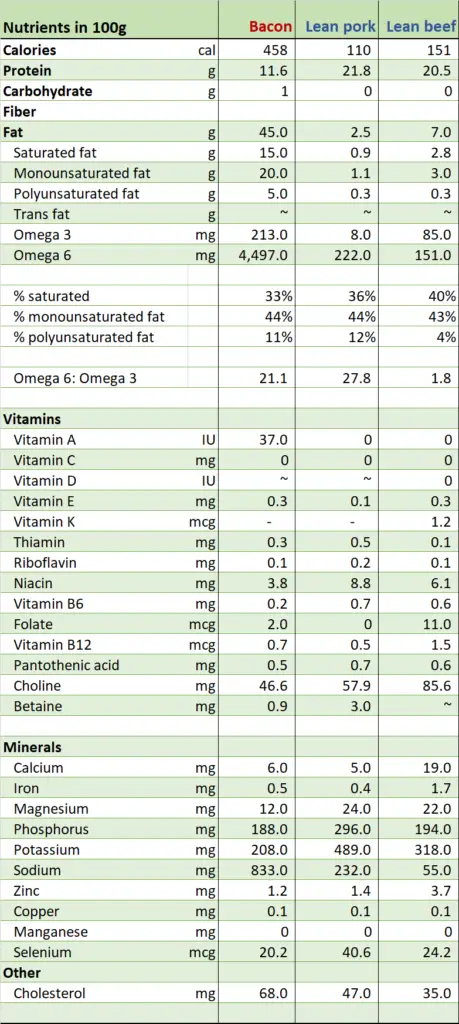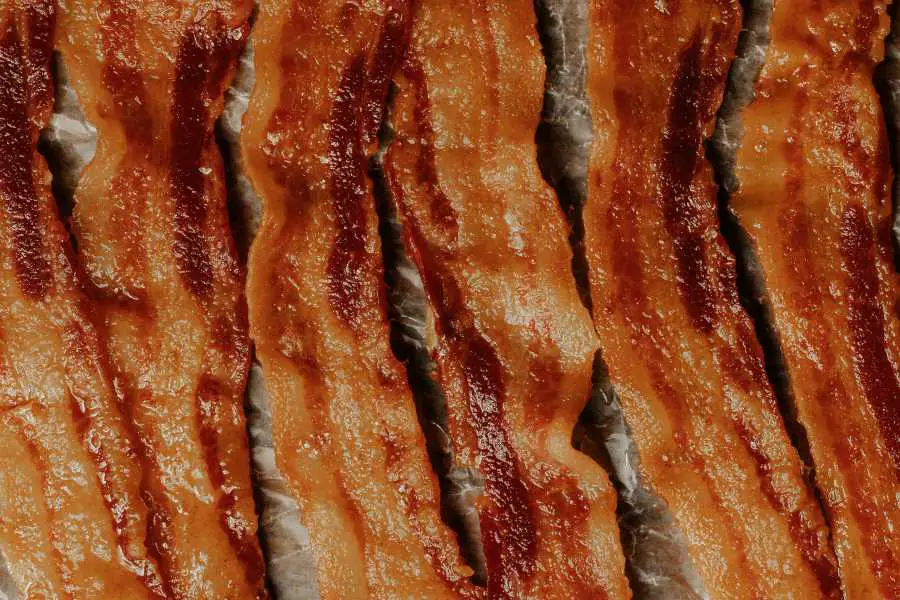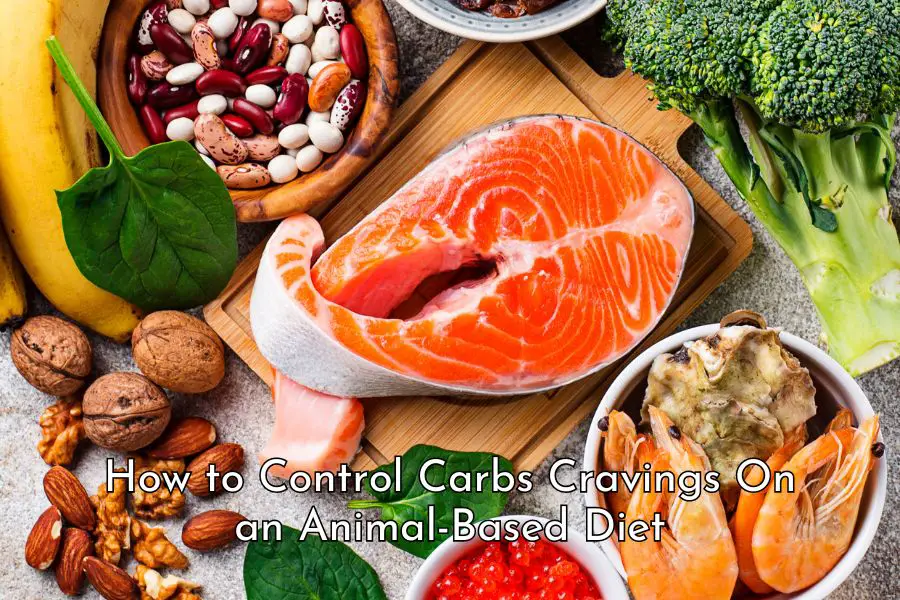Bacon is tasty, cheap, easy to cook, and definitely a carnivore food. Many people are crazy about bacon. But is it okay to eat bacon every day on the carnivore diet?
In summary, bacon should be eaten very sparingly on the carnivore diet because it is a processed meat that is rich in many nutrients but also very high in total fat, polyunsaturated fat, and sodium. It also contains additives for curing or preserving purposes which have been linked to some health risks.
From an evolutionary perspective, our ancestors feasted on large herbivores for millions of years. The closest you can get to large herbivores these days are cows, not factory-farmed pigs and poultry which are raised in poor conditions relative to cows.
The remainder of the post covers how bacon is made, what is in it and its nutritional contents and why you should eat it very sparingly on the carnivore diet.
How is bacon made?
Bacon is typically made from pork belly or other fatty pork cuts.
Traditionally, bacon is made using a dry-curing process where the raw bacon is rubbed with salt and seasonings and left to cure over a couple of weeks. After being cured, the bacon is rinsed off, dried, and smoked for further preservation and flavoring.[1]
Most commercial bacon today is made using a wet-curing process where the bacon is injected with or soaked in a brine made from salt, sugar, sodium nitrite, other seasonings, and chemicals. After curing, it is also dried and smoked to enhance flavor and help preserve.[2]
What is in bacon?
Common ingredients in bacon are pork, salt, sugar, seasonings, sodium nitrite, sodium phosphate, sodium erythorbate and smoke. However, you can also find bacon that is cured using plant extracts instead of chemicals.

Bacon’s nutritional content
The table below shows the full nutritional profiles of bacon compared to lean pork and lean beef.

Is it okay to eat bacon every day on the carnivore diet?
By looking at how bacon is made, what is in it, and its nutritional profile, it is clear that bacon should be eaten very sparingly on the carnivore diet because:
- Bacon is very high in total fat and polyunsaturated fat
- Bacon is high in sodium
- Bacon has a poor omega 6 to omega 3 ratio
- Bacon contains additives that have been linked to certain health risks
- Commercial bacon today is typically made from pork and factory-farmed pigs are raised in poor conditions relative to ruminants
- From an evolutionary perspective, our ancestors feasted on large herbivores for millions of years, not small omnivores like pigs and poultry.
Bacon is high in total fat and polyunsaturated fat
Like most animal source food, bacon is rich in many nutrients.
However, it is clear that bacon is very high in calories. As can be seen from the above nutritional data, 100 grams of bacon deliver a whopping 458 calories compared to 110 and 151 from lean pork and lean beef respectively.
Bacon’s high-calorie content comes from its high-fat percentage. One hundred grams of bacon has 45 grams of fat and 5 grams of which is polyunsaturated fat which has been liked to health risks such as increased cancer risk, suppression of the immune system, lowering good cholesterol (HDL-C) and increasing the susceptibility of LDL to oxidation.[4]
While you don’t need to fear fat on the carnivore diet, you only need so many calories in a day and if you eat a lot of fat, you won’t have room for other more nutrient-dense food. It would also make sense to limit your bacon consumption if you want to control your weight.
Bacon is high in sodium
Bacon is also very high in sodium, this is unsurprising given how it is made. One hundred grams of bacon has 833mg of sodium which delivers 35% of the recommended daily value for an average adult.
For your information, observational studies have found an association between high dietary salt intake and gastric cancer and, in some people, high salt intake may raise blood pressure.[5, 6]
Bacon has a poor omega 6 to omega 3 ratio
As can be seen from the table above, bacon has a very high omega 6 to omega 3 ratio of 21:1 compared to 1.8 only for beef. Though this could vary greatly depending on samples tested, beef and lamb generally have much lower omega 6 to omega 3 ratios compared to pork.
Our ancestors are thought to have consumed an omega 6 to omega 3 ratio of approximately 1:1 therefore, it makes sense to limit consumption of food high in omega 6 like pork fat. [7]
Bacon contains additives that have been linked to certain health risks
As can be seen above, bacon contains curing agents like nitrite which when cooked at high heat can result in the formation of carcinogens nitrosamines.[8]
Consumption of processed meat like bacon has also been linked with higher cancer risks, heart disease and other health issues.[9, 10, 11]
Although these are results of observational studies and can’t prove that processed meat causes cancers or heart diseases, it makes sense to avoid additives in your food. Personally, I wouldn’t want to put things that can effectively stop bacteria and mold growing for months in my body.
Factory-farmed pigs are raised in poor conditions[12, 13, 14, 15, 16]
Factory-farmed pigs are generally raised in poor conditions and are fed an unhealthy diet
As discussed in great detail in this post, farmed pigs generally spend their entire lives in barren crates or concrete pens so small that they have no room to turn around. They do not have outdoor access. Sows spend their reproductive lives confined to a small gestation crate.
They are typically fed a grain-based diet consisting of corn, soybean, wheat, barley, oat, and added vitamins and minerals.
However, pigs are omnivores, if raised in pastures, they will eat bugs, insects, grass, fruit, seeds, roots, tubers, bulbs, and foliage and be given supplementary feed.
Feral pigs in the wild will eat many things including small mammals, birds, reptiles, frogs, crayfish, eggs, earthworms and other invertebrates, and all parts of plants including the fruit, seeds, roots, tubers, bulbs, and foliage.
Because farmed pigs are raised in unnatural barren environments, unable to socialize, explore and forage, they are stressed and aggressive abnormal behaviors like tail-biting are common. To fix this problem, piglets routinely have their tails and teeth trimmed off without anesthetics.
Factory-farmed poultry and fish suffer from similar poor living conditions as factory-farmed pigs.
Ruminants are generally better raised
Cattle raised for beef are the only factory-farmed animals that are still raised largely outdoors. They graze on pasture until they are about 12 to 18 months old before being sent to a feedlot. They will spend about 4 to 6 months at the feedlot where they are fed a grain-based diet to accelerate weight gain. Grass-fed beef cattle, however, will spend their whole lives on pasture.[17, 18, 19, 20]
There is no research that looks at the level of antibiotics and other drugs in ruminants, pigs, poultry and other farmed animals. However, generally, it is expected that the better an animal is raised, the more healthy it’s likely to be and the less likely it’s given drugs to treat or prevent health problems.
Poor farming conditions produce poor quality meat
A small study has found that pasture-raised porks have much better omega 6 to omega 3 ratios compared to factory-farmed porks. In particular:[21]
- conventional factory-farmed pork’s ratio was 29:1
- pasture-raised pigs fed with grains’ ratio was 9:1
- pasture-raised pigs fed with 50% reduced grains’ ratio was 10:1
- pasture-raised pigs fed no grains at all, the ratio was an impressive 2:1.
Our ancestors feasted on large herbivores
From an evolutionary perspective, our ancestors feasted on large herbivores for millions of years.[22]
The closest you can get to large herbivores these days are cows, not small omnivore animals like pigs and poultry.
As mentioned above, generally, farmed ruminants are also raised in better conditions than pigs, poultry and fish.
How to be bacon-wise on the carnivore diet?
You should treat bacon as a treat rather than a part of your staple on the carnivore diet.
I don’t have a magic formula to come up with exactly how much bacon you can eat in a day or in a week. But like treats on any diet, a small serving once or twice a week would be enough.
If you can afford bacon made from pasture-raised pork that is free of chemicals, you can certainly enjoy bacon a little bit more because, as mentioned above, pasture-raised pork has a much better omega 6 to omega 3 ratio compared to conventionally farmed pork.
Rather than eating bacon straight which can very easily result in over-eating, you can use a little bit of bacon to add flavors to other dishes like meat stew, ground beef, pate, carnivore crepes, or toppings for your carnivore pizzas.





